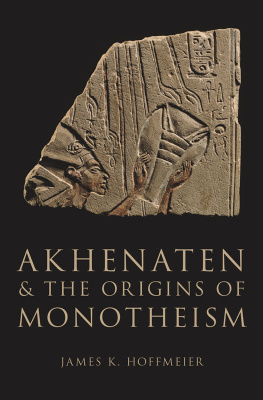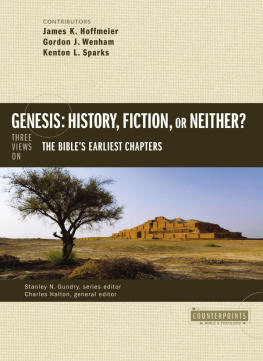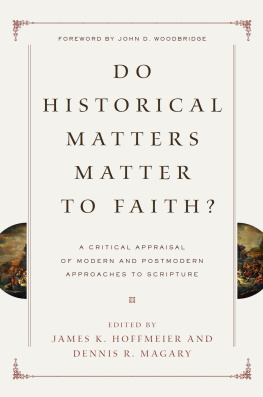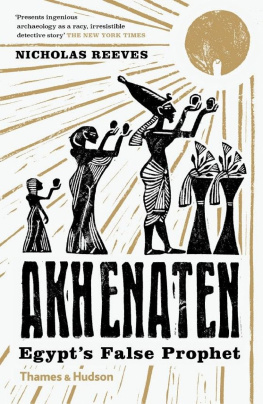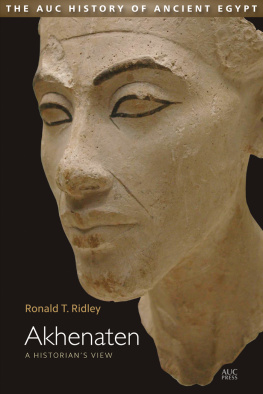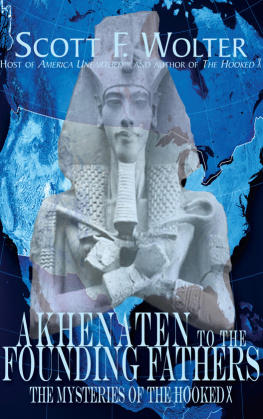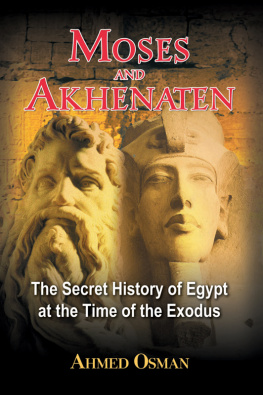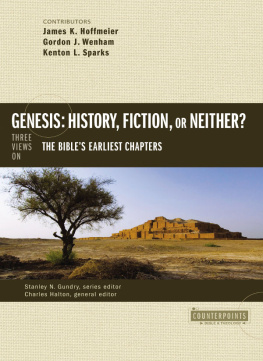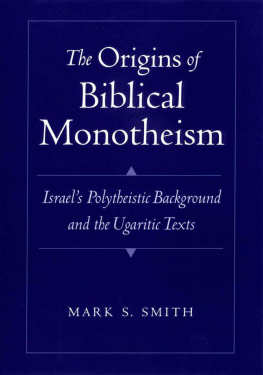James K. Hoffmeier - Akhenaten and the Origins of Monotheism
Here you can read online James K. Hoffmeier - Akhenaten and the Origins of Monotheism full text of the book (entire story) in english for free. Download pdf and epub, get meaning, cover and reviews about this ebook. year: 2015, publisher: Oxford University Press, genre: Religion. Description of the work, (preface) as well as reviews are available. Best literature library LitArk.com created for fans of good reading and offers a wide selection of genres:
Romance novel
Science fiction
Adventure
Detective
Science
History
Home and family
Prose
Art
Politics
Computer
Non-fiction
Religion
Business
Children
Humor
Choose a favorite category and find really read worthwhile books. Enjoy immersion in the world of imagination, feel the emotions of the characters or learn something new for yourself, make an fascinating discovery.
- Book:Akhenaten and the Origins of Monotheism
- Author:
- Publisher:Oxford University Press
- Genre:
- Year:2015
- Rating:5 / 5
- Favourites:Add to favourites
- Your mark:
- 100
- 1
- 2
- 3
- 4
- 5
Akhenaten and the Origins of Monotheism: summary, description and annotation
We offer to read an annotation, description, summary or preface (depends on what the author of the book "Akhenaten and the Origins of Monotheism" wrote himself). If you haven't found the necessary information about the book — write in the comments, we will try to find it.
Akhenaten and the Origins of Monotheism — read online for free the complete book (whole text) full work
Below is the text of the book, divided by pages. System saving the place of the last page read, allows you to conveniently read the book "Akhenaten and the Origins of Monotheism" online for free, without having to search again every time where you left off. Put a bookmark, and you can go to the page where you finished reading at any time.
Font size:
Interval:
Bookmark:

AKHENATEN AND THE ORIGINS OF MONOTHEISM

Oxford University Press is a department of the University of Oxford. It furthers the Universitys objective of excellence in research, scholarship, and education by publishing worldwide.
Oxford New York
Auckland Cape Town Dar es Salaam Hong Kong Karachi Kuala Lumpur Madrid Melbourne Mexico City Nairobi New Delhi Shanghai Taipei Toronto
With offices in
Argentina Austria Brazil Chile Czech Republic France Greece Guatemala Hungary Italy Japan Poland Portugal Singapore South Korea Switzerland Thailand Turkey Ukraine Vietnam
Oxford is a registered trade mark of Oxford University Press in the UK and certain other countries.
Published in the United States of America by
Oxford University Press
198 Madison Avenue, New York, NY 10016
Oxford University Press 2015
All rights reserved. No part of this publication may be reproduced, stored in a retrieval system, or transmitted, in any form or by any means, without the prior permission in writing of Oxford University Press, or as expressly permitted by law, by license, or under terms agreed with the appropriate reproduction rights organization. Inquiries concerning reproduction outside the scope of the above should be sent to the Rights Department, Oxford University Press, at the address above.
You must not circulate this work in any other form and you must impose this same condition on any acquirer.
Library of Congress Cataloging-in-Publication Data
Hoffmeier, James Karl, 1951
Akhenaten and the origins of monotheism / James K. Hoffmeier.
p. cm.
Includes bibliographical references and index.
ISBN 9780199792085 (hardcover : alk. paper) ISBN 9780190266790 (ebook) ISBN 9780190217693 (online content) 1. EgyptReligion. 2. Sun worshipEgypt. 3. Monotheism. 4. Akhenaton, King of EgyptReligion. I. Title.
BL2443.H635 2015
299.31dc23
2014021568
1 3 5 7 9 8 6 4 2
Printed in the United States of America on acid-free paper
Dedicated to
Donald B. Redford,
my professor and friend
on the occasion of his eightieth birthday
NO FIGURE FROM ancient Egyptian history has stimulated more interest and literature than Akhenaten, the 14th century B.C. pharaoh. Students of Egyptology, history, and religion, be they amateurs or academics, are equally fascinated by this intriguing ruler because of his bizarre appearance in statues and reliefs, as well as those of his family. The art of this period amazes the art historian with its naturalism and realism. The cuneiform tablets discovered in 1887 at Tell el-Amarna in Middle Egypt, known as the Amarna Letters, provide an unparalleled glimpse into dealings between Egypt and world potentates and local petty rulers of Anatolia, Mesopotamia, Canaan, and Syria. Then, too, there are all the perplexing issues surrounding his reign: moving his capital from Thebes to Amarna, his name change, and the uncertainty of the royal succession. Did Queen Nefertiti reign with him or succeed him? How was king Tut related to Akhenaten? Akhenatens unique brand of solar worship evokes vigorous discussions. Was he a henotheist, monotheist, or merely focused on a novel ancestor cult, as has recently been proposed? Was he so preoccupied with his devotion to his sun-god, Aten, that he allowed Egypts empire in western Asia to implode?
With so many mysteries surrounding Akhenaten and his relatively short 17-year reign, nearly every question raised here has been addressed and various interpretations argued over the decades. Indeed, the body of literature on Akhenaten and the so-called Amarna period is immense, with many excellent articles and books available by eminent scholars like Donald Redford, Cyril Aldred, Nicholas Reeves, Jan Assmann, Erik Hornung, and Barry Kemp. With so much good literature on Akhenaten and his era, why would I even attempt to write another book on Akhenaten? A brief biographical note is in order. I grew up in Egypt. In fact, a small village in Middle Egypt was home. It was located on the western side of the Nile, not far from Tell el-Amarna, where Akhenaten established his capital (Akhet-Aten) around 1347 B.C. As a youth I was able to stroll the streets and explore the ruins and tombs of Akhet-Aten. Within 5 miles (8 km) of my childhood home in the village of Nazlet Herz was the ancient city of Hermopolis (in Arabic, Ashmunein). Its necropolis in the nearby desert was the location of one of Akhet-Atens 14 boundary inscriptions. Many times my family visited this site, even having picnics near the strange depiction of Akhenaten, Nefertiti, and their daughters adoring the sun-disc that stood atop the stela.
These early experiences no doubt influenced my decision to study Near Eastern archaeology as my undergraduate major at Wheaton College (IL). Graduate studies took me to the University of Toronto, where one of my principal teachers was Dr. Donald Redford, professor of Egyptology, a distinguished scholar and one of the leading experts on Akhenaten. He was also the director of the Akhenaten Temple Project that was engaged in piecing together photographs of thousands of inscribed blocks that revealed amazing decorated scenes from Akhenatens Theban temples. After the kings death they were violently destroyed and dismantled, and the blocks were dispersed and reused elsewhere. Through this painstaking work, Redford broke new ground on the early years of Akhenatens developing religion, which is frequently called Atenism.
In early 1975, Professor Redford began excavations east of Karnak temple in Luxor, Egypt, thought to be the area where Akhenatens long-lost temples were located. During the summer season that year, I had the privilege of working with the project, and again in 1977. Subsequently, Dr. Redford invited me to study the assembled chariot scenes from the Theban temples for publication in Akhenaten Temple Project, Volume 2. Being able to work with the Akhenaten Temple Project furthered my interest in this kings religious revolution.
In 1992, when I was considering engaging in field work in Egypt, Dr. Redford, who by then was investigating Tell Kedua in North Sinai, wrote to me and encouraged me to come work in Sinai. There was some urgency to excavate endangered sites east of the Suez Canal before they were destroyed due to the As-Salam irrigation project. Following this suggestion, I spent short seasons in 1994, 1995, and 1998 investigating possible sites to dig. At the urging of Dr. Mohamed Abd el-Maksoud of the Supreme Council for Antiquities (now the Ministry of Culture for Antiquities), I visited a threatened site that had already experienced significant damage from the irrigation project; a drainage canal already crossed the east end of the tell, roads were being laid, and pipelines dug. It was Tell el-Borg. During the initial survey of the site in 1999, my team discovered scores of New Kingdom period potsherds on the surface, including a painted Amarna blue sherd that immediately caught my attention, since this type of decoration was so well known from Amarna period pottery. Could it be that this site flourished during the Amarna era? Subsequent excavations revealed two New Kingdom period frontier forts. During the first seasons work, we uncovered some reused talatat blocksthe very type of building blocks developed by Akhenatens architects for the Aten Temples at Karnak! Had there been an Aten temple that was demolished at the site or somewhere nearby in North Sinai? In the nearly decade of work at Tell el-Borg, it became clear that throughout the Amarna era this site was occupied, and we also found evidence of Akhenatens iconoclasm against Amun (see ).
Next pageFont size:
Interval:
Bookmark:
Similar books «Akhenaten and the Origins of Monotheism»
Look at similar books to Akhenaten and the Origins of Monotheism. We have selected literature similar in name and meaning in the hope of providing readers with more options to find new, interesting, not yet read works.
Discussion, reviews of the book Akhenaten and the Origins of Monotheism and just readers' own opinions. Leave your comments, write what you think about the work, its meaning or the main characters. Specify what exactly you liked and what you didn't like, and why you think so.

